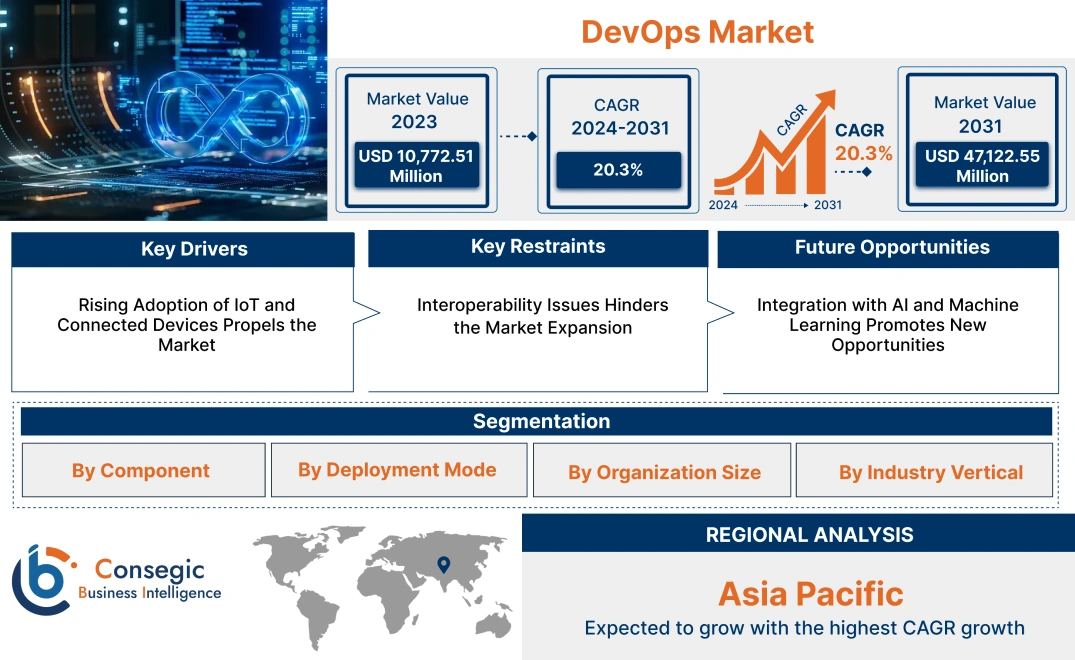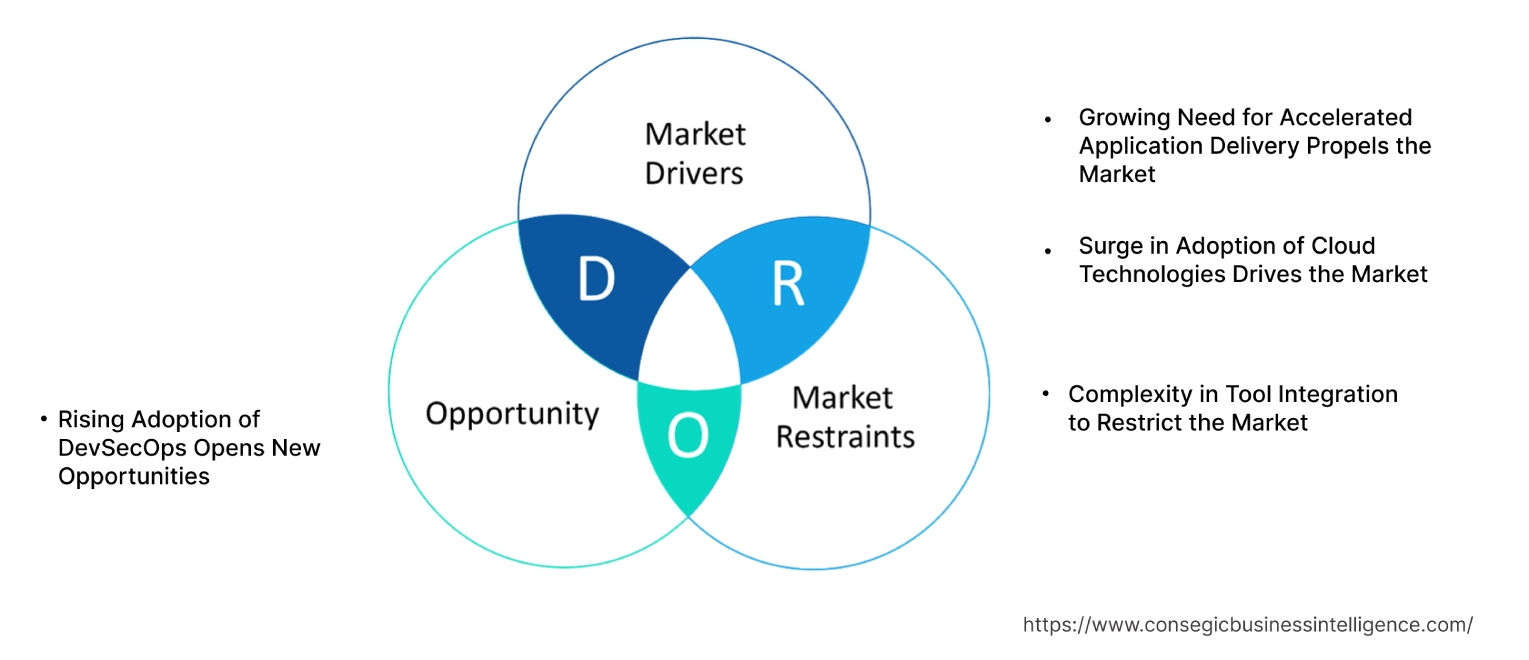- Summary
- Table Of Content
- Methodology
DevOps Market Size:
DevOps Market size is estimated to reach over USD 47,122.55 Million by 2031 from a value of USD 10,772.51 Million in 2023 and is projected to grow by USD 12,762.84 Million in 2024, growing at a CAGR of 20.3% from 2024 to 2031.
DevOps Market Scope & Overview:
DevOps is the collaboration of development (Dev) and operations (Ops) for teams to deliver faster, more efficient, and enhanced services. This is to ensure a shorter development lifecycle of products, incorporating rapid feedback cycles for continuous improvement. The use cases range from continuous integration, deployment, automation testing, microservices deployment, monitoring, and logging to collaborative development, security and compliance, and version control. The primary end-use customers include application stakeholders, IT professionals, retail, and manufacturing.
DevOps Market Insights:
Key Drivers:
Growing Need for Accelerated Application Delivery Propels the Market
Due to the rapid digitalization and urbanization in today's fast-paced world, products, and applications are required to be deployed at a faster rate, in order to meet consumer demands. DevOps introduces efficiency to the continuous integration, deployment, and automation to deliver the applications. Moreover, it reduces the risk when releasing software updates, allowing much more flexibility in the production environment. Teams can collaborate through the cross-collaboration feature.
- In 2021, JFrog launches a Private Distribution Network, as a part of the JFrog DevOps platform. This allows organizations to set up and manage a secure and scalable hybrid distribution for updates regarding the software.
Therefore, the market trends analysis depicts that the growing need for faster product deployment is driving the DevOps market demand.
Surge in Adoption of Cloud Technologies Drives the Market
The integration of cloud environments with DevOps enhances the flexibility scalability, and efficiency in monitoring and deploying applications. Additionally, they allow teams to utilize tools and services to collaborate, monitor, and optimize resources, ensuring consistent and faster deployment, with automation of the processes.
- In May 2023, IBM launched a Hybrid Cloud Mesh, allowing the DevOps and CloudOps teams a collaborative experience and toolset to solve development-related issues.
Therefore, as per the market trends analysis, the efficiency and automation of tasks allow faster delivery of products surging the DevOps market demand.
Key Restraints :
Complexity in Tool Integration to Restrict the Market
Due to the specific functionality and configuration, it is difficult to integrate the tools efficiently. Whereas, DevOps requires seamless integration of tools to ensure continuous development, monitoring, and security. This creates a huge challenge for organizations, wanting to ensure the smooth operation of processes, this issue is more evident in legacy systems where the components might not be easy to integrate with modern tools.
Therefore, the inefficiency caused due to the usage of different tools, restraints the DevOps market opportunities.
Future Opportunities :
Rising Adoption of DevSecOps Opens New Opportunities
DevSecOps is the integration of cybersecurity and DevOps, mostly utilized in the software development lifecycle. This technology ensures the security of the development process and adopts various security practices. Moreover, the increase in cyber threats and regulatory requirements in the development process drives the adoption of DevSecOps in the industries.
- In May 2023, GitLab Inc. launched its AI-powered enterprise DevSecOps. This technology allows writing code faster and better, vulnerability detection, security testing, and analysis.
Therefore, the surge in security threats and the requirement for proper cybersecurity tools drive the DevOps market opportunities.
DevOps Market Segmental Analysis :
By Component:
Based on component, the market is segmented into Solutions (Continuous Integration/Continuous Deployment (CI/CD), Testing & Monitoring, Configuration, Security, and Others) and Services (Managed Services, API Services, Container Services, and Others).
Trends in the Component:
- Complex processes like code testing, debugging, and monitoring of performance are increasingly being automated by the continuous integration of DevOps and AI.
- The integration of edge computing is significantly increasing the data processing and processing speed for IoT and remote applications.
Solutions (CI/CD) accounted for the largest revenue share in 2023.
- The deployment and integration of code changes are done at regular intervals of time and is an integral component in DevOps, this practice is known as Continuous Integration/Continuous Deployment (CI/CD).
- This part is very crucial in large-scale and tech-based industries, as it allows reduced errors and downtime, making the software development process faster.
- For instance, the GitLab CI/CD allows debugging of code at the early stages of the development lifecycle and ensures that deployed code complies with the code standards that are established.
- The CI/CD capabilities including automation testing, continuous monitoring, and faster fallouts, can be further enhanced with the integration of cloud-native architectures and CI/CD pipelines.
- In conclusion, the innovations in tech-heavy and large industries drive the growth of the segment in the market.
Services (Managed Services) are anticipated to register the fastest CAGR during the forecast period.
- A broad range of IT services are provided by managed services, including management of infrastructure, cloud operations, and monitoring of applications.
- These services are essential in organizations that lack the skills to manage the complex operations related to it.
- The demand for these services is essentially important in companies that will shift towards cloud-native architectures, requiring expert support.
- For instance, Axon provides various DevOps-managed services including consulting, cloud infrastructure management, migration to the cloud, transformation, CI/CD, and on-premise configuration.
- Therefore, as the companies are moving towards complex technologies, a significant surge in the DevOps market trends can be observed.
By Deployment Mode:
By development mode, the market is segmented into On-premise and Cloud (Public, Private, and Hybrid).
Trends in the Deployment Mode:
- Advances in encryptions and zero-trust architectures are some of the major innovations in the private cloud sector ensuring the data privacy of healthcare and finance industries.
- To ensure faster debugging and deployment of code with the local infrastructure, AI-driven automation tools are being integrated continuously.
The cloud sector accounted for the largest revenue of the total DevOps market share in 2023.
- Cloud-based DevOps platforms minimize the dependence on physical components, allowing quicker deployment of applications.
- Various services are offered including automation, monitoring, and security by renowned cloud providers including Google Cloud AWS and Microsoft Azure.
- These services are necessary for enterprises that adopt microservices architectures, enabling them to streamline their workflows.
- For instance, Google Cloud's Cloud build allows users to trigger DevOps workflows that are fully managed from source code repositories that are hosted in private networks.
- Hence, the growth in the adoption of cloud-native technologies and cloud deployment mode in organizations, places this cloud technology as the largest sector by deployment mode in the market.
Hybrid Cloud is anticipated to register the fastest CAGR during the forecast period.
- Hybrid cloud environments combine the advances of both public and private cloud infrastructures, providing enhanced efficiency, data privacy, flexibility, and low cost.
- Enterprises with on-premise infrastructure utilize the hybrid cloud infrastructure to utilize the scalability of the public cloud.
- Organizations with highly sensitive data find this technology more beneficial with better performance and security.
- For instance, the DevOps collaboration platform by Softility, reduces the IT cost significantly for the Fortune 500 data company.
- In conclusion, the optimized performance, high security, and low cost of hybrid cloud drives the DevOps market growth.
By Organization Size:
By organization size, the market is segmented into Large Enterprises and Small & Medium Enterprises (SMEs).
Trends in the Organization Size:
- To ensure faster release of products and reduced human interference AI-enhanced automation systems are being integrated by
- Tools such as Jenkins, Docker, and Ansil are being adopted by organizations as they are cost-effective and give better efficiency.
Large Enterprises accounted for the largest revenue share of the total DevOps market share in 2023.
- DevOps' cross-departmental collaboration features to benefit large enterprises, enhancing the development of products and pipelines.
- To reduce operational inefficiencies these organizations utilize the scale operations feature, thus maintaining continuous delivery of products.
- Cloud platforms are integrated with these monitoring and deployment tools by organizations to ensure the smooth operation of complex workflows.
- In May 2021, Amazon announced the expansion of capabilities for Amazon DevOps Guru. This supports the CloudWatch Agent Container Insights by providing improved coverage for EC2, EKS, and ECS.
- Thereby, the complexity of operations and adoption of continuous deployment technologies drive the DevOps market growth in this sector.
SMEs are anticipated to register the fastest CAGR during the forecast period.
- The flexibility to deploy products at lower cost is achieved by the adoption of cloud-based DevOps tools by the SMEs. This opens up many opportunities in the e-commerce and fintech sectors.
- The scalability, faster strategies, and improved customer satisfaction are achieved by the adoption of these technologies and ensure smooth IT operations.
- A 2022 study by GitLab, highlights the importance of DevOps technologies in SMEs. It improves the overall efficiency of the production processes with a collaborative atmosphere and automates parts of the processes.
- As per the analysis, the flexibility and scalability provided drive the DevOps market trends in this sector.
By Industry Vertical:
The market is segmented by industry vertical into IT & Telecom, BFSI, Retail & E-commerce, Healthcare, Government, Manufacturing, Education, and Others.
Trends in the Industry Vertical:
- Blockchain technologies are continuously being integrated into DevOps to ensure secure transactions.
- There is an increase in the adoption of AI-based technologies to modernize legacy systems, ensuring efficiency.
Healthcare accounted for the largest revenue share of 27.44% in 2023.
- Healthcare applications like telemedicine and patient management are increasingly adopting DevOps practices to streamline the processes.
- They also utilize these technologies to ensure security speed, and compliance with HIPAA.
- These technologies ensure the integration of digital tools and electronic health records (HER) to ensure efficient operations. They are also used in the area of telehealth.
- In March 2023, an agreement of $3 million for Cloud DevOps Managed Services was secured by Healthcare Triangle, Inc., ensuring the security and scalability of operations with the delivery of the next-generation HITRUST-certified Cloud DevOps Managed Services.
- Therefore, the continuous adoption of these technologies in the healthcare sector drives the market.
Retail & E-commerce is anticipated to register the fastest CAGR during the forecast period.
- The efficiency of the e-commerce platforms is enhanced with the adoption of DevOps, ensuring speedy updates, better customer experience, and easier transactions.
- During high-traffic periods like Black Friday, these technologies maintain the smooth operation of large-scale online stores.
- They also ensure the integration across multiple sales channels for efficient operations, as well as respond to the changing customer demands.
- In conclusion, as per the segmental analysis, as the retail and e-commerce sector continues to grow and adapt to technological advancements, this sector will see an exponential curve in the market.
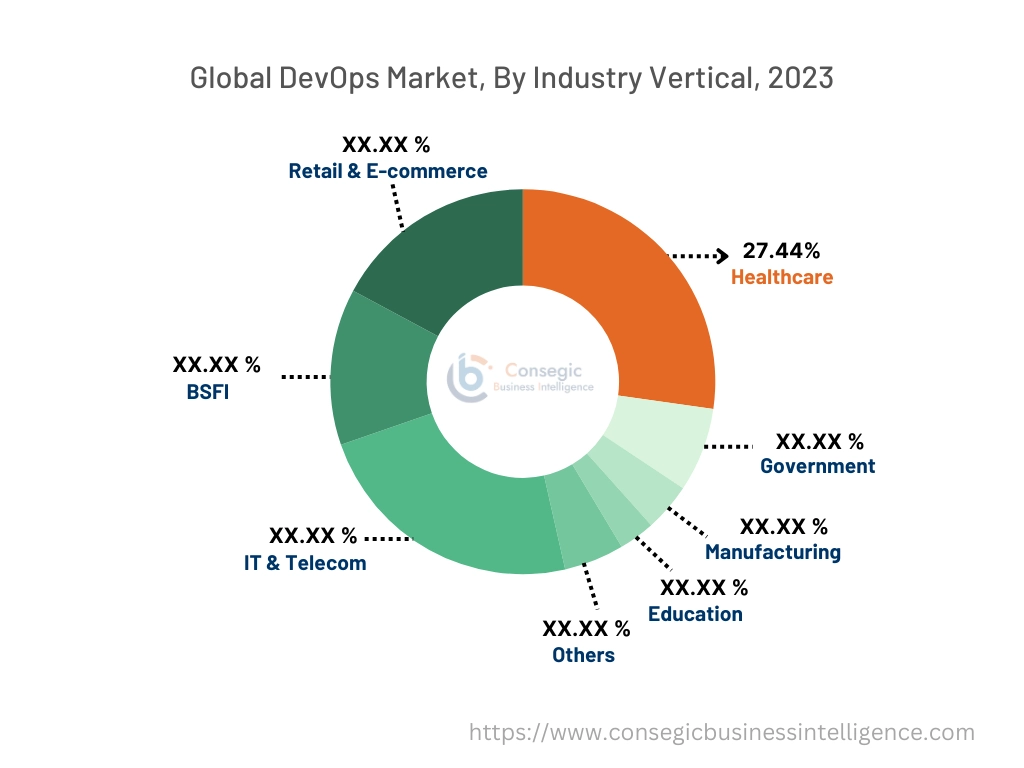
Regional Analysis:
The regions covered are North America, Europe, Asia Pacific, the Middle East and Africa, and Latin America.
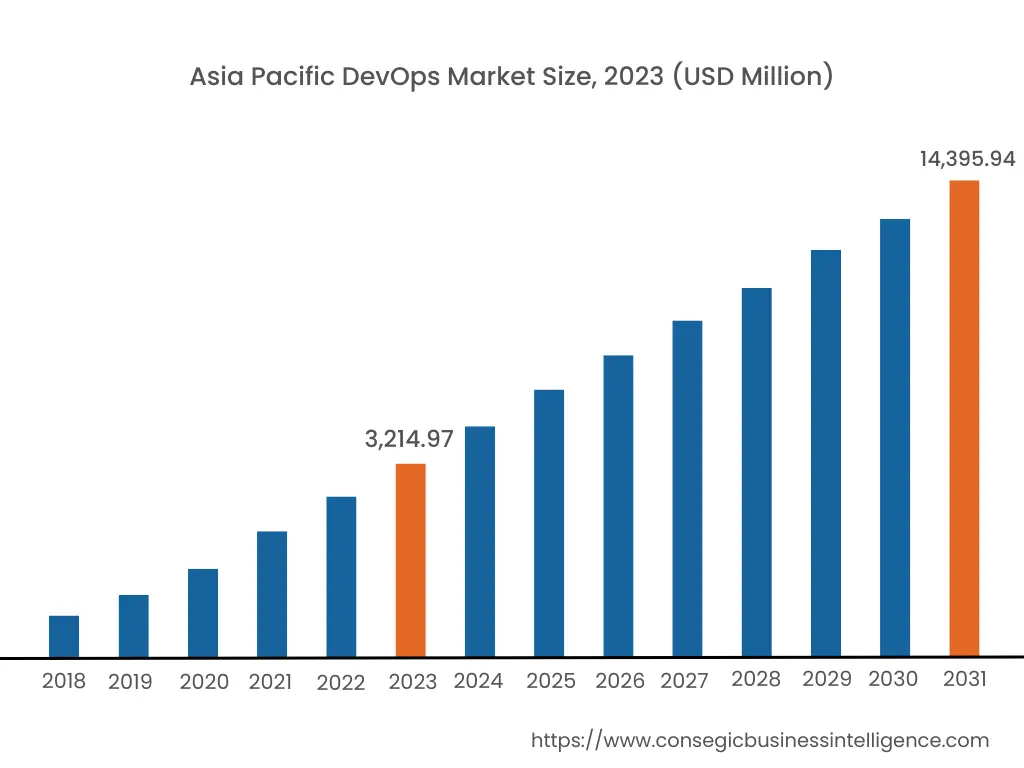
Asia Pacific region was valued at USD 3,214.97 Million in 2023. Moreover, it is projected to grow by USD 3,816.47 Million in 2024 and reach over USD 14,395.94 Million by 2031. Out of this, China accounted for the maximum revenue share of 34.5%. As per the DevOps market analysis, the rapid digitalization of industries is one of the driving factors for this growth, especially in countries like India and China. The growing demand for continuous integration and continuous delivery (CI/CD) practices, automation technologies, and cloud infrastructure in the region are also a few of the contributing factors.
- For instance, the China Mobile group built the Panji Paas Platform to meet the user requirements and tackle the issue of complex cloud-based service architecture, using the the Panzhou DevSecOps platform.
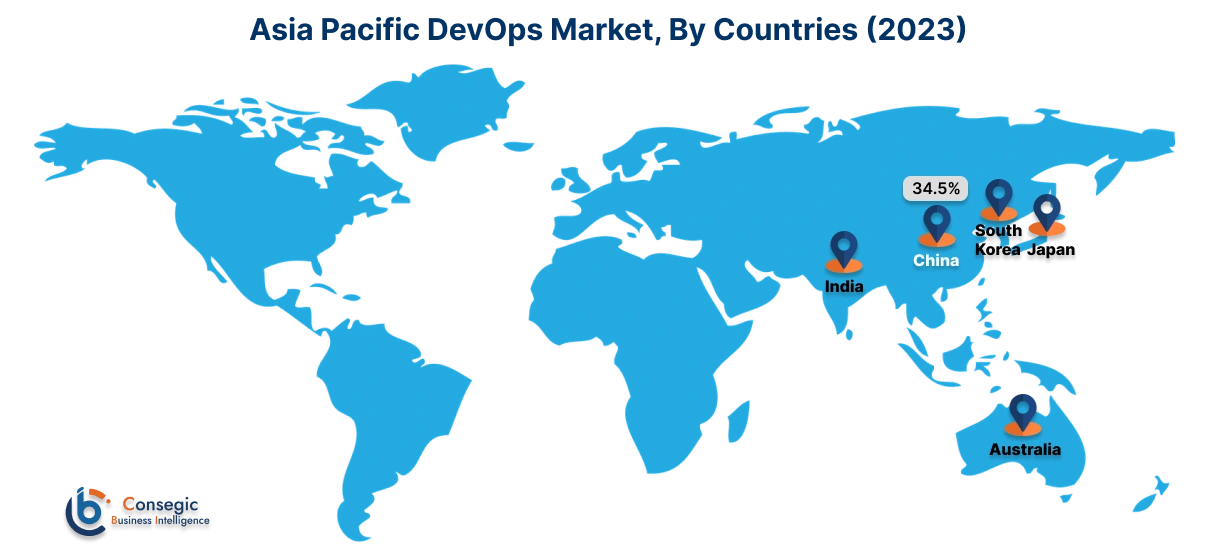
North America is estimated to reach over USD 16,992.39 Million by 2031 from a value of USD 3,848.03 Million in 2023 and is projected to grow by USD 4,562.60 Million in 2024.
- For instance, Oracle, an American multinational company, announces the two software release strategies for deploying applications, these include the Oracle Cloud Infrastructure (OCI) DevOps deployment pipelines - Blue-Green deployments and Canary deployments.
This growth is due to the surging demand for operational efficiency, accelerated product delivery, and time efficiency in the organizations of this region. The increasing focus on cloud computing and seamless product deployment and automation are a few of the factors accelerating the DevOps market expansion.
The adoption of microservices architectures is the primary driving factor for the surge of this market in Europe. In the Middle East and Africa, the rapid change in the digital landscape is leading to the growth of this technology in the region. Due to the growing focus of business towards enhanced product deliveries, a surge in the DevOps market expansion in Latin America.
Top Key Players & Market Share Insights:
The DevOps market is highly competitive with major players providing products and services to the national and international markets. Key players are adopting several strategies in research and development (R&D), product innovation, and end-user launches to hold a strong position in the global DevOps market. Key players in the DevOps industry include -
- IBM Corporation (USA)
- Microsoft Corporation (USA)
- Google LLC (USA)
- Atlassian Corporation Plc (Australia)
- Puppet, Inc. (USA)
- Amazon Web Services, Inc. (USA)
- Red Hat, Inc. (USA)
- GitLab Inc. (USA).
- Docker, Inc. (USA)
- Chef Software, Inc. (USA)
Recent Industry Developments :
Product Launches:
- In July 2024 AllSpice.io launched the AllSpice Actions, a DevOps functionality that allows the automation of workflows for electrical engineers.
- In October 2023, LaunchDarkly announced the Galaxy Product Release, which enables the manufacturing of products according to customer requirements. This allows experimentation, measurement rollout, and mobile development of the product giving a new definition to DevOps technology.
Product Expansion:
- In December 2023, the Beta Access was expanded to CopadoGPT for every customer, by Copado. CopadoGPT is a cross-platform with a lot of Salesforce expertise along with the DevOps intelligence layer.
Mergers & Acquisition:
- In June 2024, Qwak was acquired by JFrog to expand its portfolio of DevOps tools to add machine learning operations (MLOps) platform.
Partnerships & Collaborations:
- In September 2024, Opkey and Flexagon enter into a strategic partnership to streamline the process of development and testing. FlexDeploy's enterprise-focused DevOps platform integration with Opkey's AI-driven test automation capabilities will enhance customer satisfaction and ensure reliability.
- In September 2024, U.today partners with Modern DevOps Melbourne to transform DevOps delivery and explore platform engineering, DevSecOps, AI, and ModelOps.
DevOps Market Report Insights :
| Report Attributes | Report Details |
| Study Timeline | 2018-2031 |
| Market Size in 2031 | USD 47,122.55 Million |
| CAGR (2024-2031) | 20.3% |
| By Component |
|
| By Deployment Mode |
|
| By Organization Size |
|
| By Industry Vertical |
|
| By Region |
|
| Key Players |
|
| North America | U.S. Canada Mexico |
| Europe | U.K. Germany France Spain Italy Russia Benelux Rest of Europe |
| APAC | China South Korea Japan India Australia ASEAN Rest of Asia-Pacific |
| Middle East and Africa | GCC Turkey South Africa Rest of MEA |
| LATAM | Brazil Argentina Chile Rest of LATAM |
| Report Coverage |
|
Key Questions Answered in the Report
How big is the DevOps Market? +
DevOps Market size is estimated to reach over USD 47,122.55 Million by 2031 from a value of USD 10,772.51 Million in 2023 and is projected to grow by USD 12,762.84 Million in 2024, growing at a CAGR of 20.3% from 2024 to 2031.
What specific segmentation details are covered in the DevOps market report? +
The DevOps report includes specific segmentation details for components, deployment mode, organization size, industry vertical, and region.
Which is the fastest segment anticipated to impact the market growth? +
In the organization size segment, Small & Medium Enterprises (SMEs) are the fastest-growing segment during the forecast period due to the advancement in technology and the focus on all sizes of organizations.
Who are the major players in the DevOps market? +
The key participants in the DevOps market are IBM Corporation (USA), Microsoft Corporation (USA), Amazon Web Services, Inc. (USA), Google LLC (USA), Atlassian Corporation Plc (Australia), Red Hat, Inc. (USA), GitLab Inc. (USA), Docker, Inc. (USA), Puppet, Inc. (USA), Chef Software, Inc. (USA)
